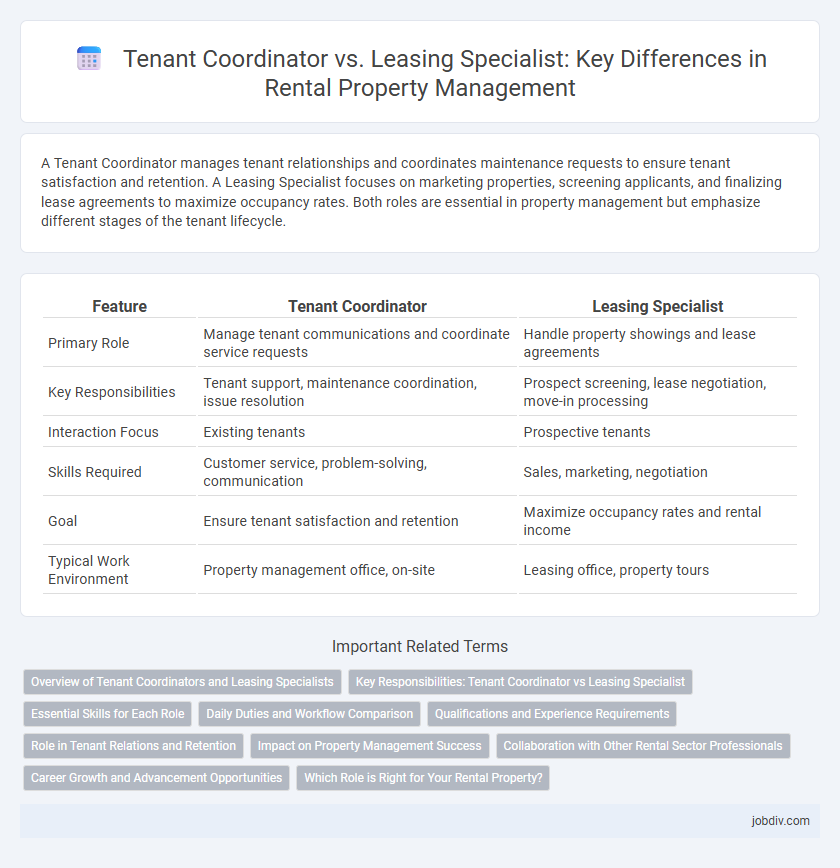A Tenant Coordinator manages tenant relationships and coordinates maintenance requests to ensure tenant satisfaction and retention. A Leasing Specialist focuses on marketing properties, screening applicants, and finalizing lease agreements to maximize occupancy rates. Both roles are essential in property management but emphasize different stages of the tenant lifecycle.
Table of Comparison
| Feature | Tenant Coordinator | Leasing Specialist |
|---|---|---|
| Primary Role | Manage tenant communications and coordinate service requests | Handle property showings and lease agreements |
| Key Responsibilities | Tenant support, maintenance coordination, issue resolution | Prospect screening, lease negotiation, move-in processing |
| Interaction Focus | Existing tenants | Prospective tenants |
| Skills Required | Customer service, problem-solving, communication | Sales, marketing, negotiation |
| Goal | Ensure tenant satisfaction and retention | Maximize occupancy rates and rental income |
| Typical Work Environment | Property management office, on-site | Leasing office, property tours |
Overview of Tenant Coordinators and Leasing Specialists
Tenant Coordinators manage tenant relations, addressing concerns and facilitating communication between residents and property management to ensure satisfaction and retention. Leasing Specialists focus on marketing rental units, screening applicants, and executing lease agreements to maximize occupancy rates and revenue. Both roles are critical in the rental industry, balancing tenant experience with operational efficiency.
Key Responsibilities: Tenant Coordinator vs Leasing Specialist
Tenant Coordinators primarily manage tenant relations by addressing maintenance requests, coordinating move-ins and move-outs, and ensuring tenant satisfaction throughout the lease term. Leasing Specialists focus on marketing rental properties, conducting property tours, processing rental applications, and securing lease agreements to maximize occupancy rates. Both roles require strong communication skills but differ with Tenant Coordinators emphasizing ongoing tenant support and Leasing Specialists driving tenant acquisition.
Essential Skills for Each Role
A Tenant Coordinator excels in communication, conflict resolution, and tenant relationship management, ensuring smooth interactions and prompt issue resolution. A Leasing Specialist requires strong sales skills, market knowledge, and contract negotiation expertise to successfully lease properties and attract prospective tenants. Both roles demand organizational abilities and attention to detail but differ in their core focus: tenant satisfaction versus property leasing efficiency.
Daily Duties and Workflow Comparison
A Tenant Coordinator manages tenant communications, handles maintenance requests, and ensures lease compliance, focusing on tenant satisfaction and retention. In contrast, a Leasing Specialist primarily oversees marketing rental properties, screening applicants, and executing lease agreements to maximize occupancy rates. Both roles collaborate closely, but the Tenant Coordinator emphasizes ongoing tenant relations while the Leasing Specialist drives initial tenant acquisition.
Qualifications and Experience Requirements
Tenant Coordinators typically require strong interpersonal skills and experience in property management or tenant relations, emphasizing conflict resolution and communication expertise. Leasing Specialists often demand knowledge of real estate laws, marketing strategies, and sales techniques, with a background in leasing or sales roles. Both positions generally seek candidates with a high school diploma or equivalent, though a degree in business or real estate enhances prospects for Leasing Specialists.
Role in Tenant Relations and Retention
A Tenant Coordinator manages daily tenant communications, addressing concerns promptly to enhance satisfaction and foster long-term retention. Leasing Specialists focus on attracting and onboarding new tenants by showcasing property benefits and facilitating lease agreements that align with tenant needs. Both roles collaboratively contribute to tenant retention by ensuring a positive rental experience and smooth leasing processes.
Impact on Property Management Success
Tenant Coordinators streamline communication between tenants and property management, enhancing tenant satisfaction and retention rates by resolving issues promptly. Leasing Specialists focus on marketing and leasing strategies that maximize occupancy and rental income, directly influencing revenue growth. Both roles are crucial, with Tenant Coordinators improving operational efficiency and Leasing Specialists driving financial performance to ensure overall property management success.
Collaboration with Other Rental Sector Professionals
Tenant Coordinators and Leasing Specialists both play crucial roles in the rental industry by collaborating extensively with property managers, maintenance teams, and real estate agents to ensure seamless tenant experiences and efficient lease management. Tenant Coordinators focus on resolving tenant concerns and coordinating communication between renters and landlords, while Leasing Specialists concentrate on marketing properties, conducting showings, and processing lease applications. Their collaborative efforts enhance occupancy rates, streamline operations, and improve tenant satisfaction across multifamily and commercial rental properties.
Career Growth and Advancement Opportunities
Tenant Coordinators focus on managing tenant relations and resolving issues, providing strong communication and problem-solving skills essential for advancing to property management roles. Leasing Specialists specialize in marketing rental properties, conducting tours, and closing leases, gaining sales and customer service expertise valuable for progressing into leasing management or real estate sales careers. Both roles offer pathways to higher positions within the rental industry through skill development and industry knowledge.
Which Role is Right for Your Rental Property?
A Tenant Coordinator focuses on managing tenant communications, resolving issues, and ensuring a positive rental experience, ideal for properties with high tenant interaction needs. A Leasing Specialist primarily handles marketing rental units, conducting showings, and processing applications, best suited for properties requiring strong tenant acquisition efforts. Choosing the right role depends on whether your rental property needs more tenant retention and relationship management or enhanced leasing and vacancy turnover strategies.
Tenant Coordinator vs Leasing Specialist Infographic

 jobdiv.com
jobdiv.com